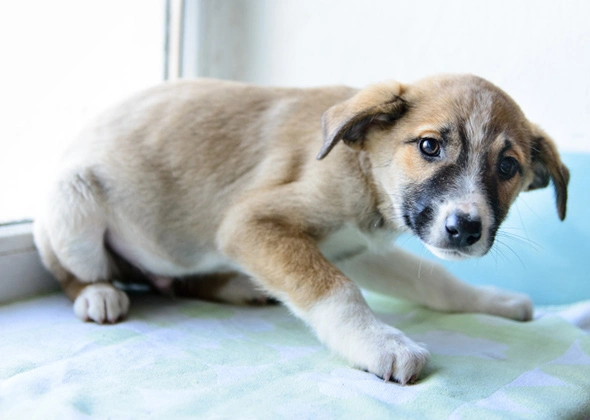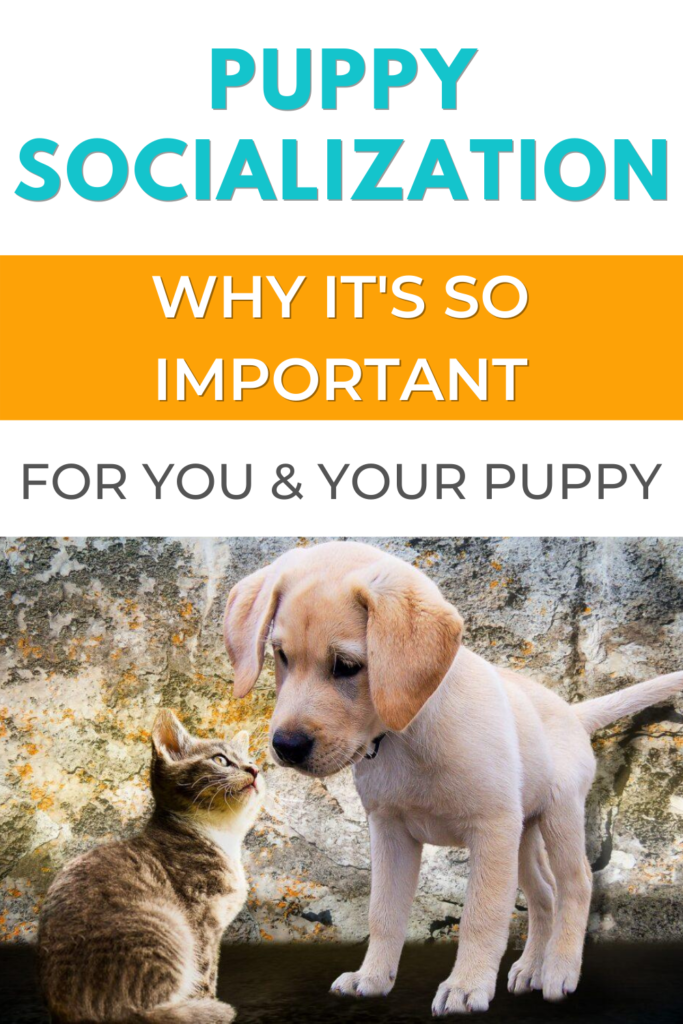Dog trainers, breeders and some veterinarians talk a lot about “puppy socialization”… but what exactly is it? Is it simply just ensuring that your puppy meets other dogs? Well, that’s part of it, but it’s only one piece of the puzzle.
WHAT IS PUPPY SOCIALIZATION?
Puppy socialization is the most critical learning period in your dog’s life. The things your puppy learns during this time plays a role in what their overall personality will be like. Proper socialization also contributes to how they react to the world around them.
What is involved in socializing your puppy? Well, you will need to introduce your puppy to as many new experiences as possible in a relatively short period of time. You will want to focus on things like:
- people of all ages, including children and the elderly;
- different places, objects, sounds/noises or smells;
- different textures or surfaces;
- other animals like other dogs, cats, etc.
In my next article I will provide with you a socialization checklist (with much more detail). You can use this checklist to act as kind of a scavenger hunt! It’s fun and removes some of the planning involved in a social outing for you and your puppy.
A puppy that isn’t properly socialized is at a higher risk of developing behavioral challenges as an adult dog. This can appear as behaviors like fear, anxiety and aggression. Not only does this make life difficult for you, it makes life difficult for your dog too. Too often these dogs are relinquished to shelters for behavioral issues… and no-one wants that.
SOCIALIZATION STARTS before your puppy comes home
“The primary and most important time for puppy socialization is the first three months of life. During this time puppies should be exposed to as many new people, animals, stimuli and environments as can be achieved safely and without causing overstimulation manifested as excessive fear, withdrawal or avoidance behavior…”
Puppy socialization actually begins with the puppy’s mother and the breeder. A responsible breeder plays an important role in beginning human socialization with the puppies. So, as a new puppy parent, the entire job of socialization doesn’t fall on your shoulders. This should help explain one reason why it is so important to get your puppy from a responsible breeder.
To understand the critical phases of socialization, let’s break it down a little further – though keeping it simple! There are two socialization periods: 1) primary socialization – which occurs during your puppy’s time with mother, siblings, and the breeder; and 2) secondary socialization, which mainly occurs once they come home to live with you.
Primary Socialization
Primary socialization occurs during approximately 3 and 5 weeks of age. To help puppies become comfortable with human handling, breeders should be starting to handle puppies during this stage. During this time puppies will learn a few skills that they will carry with them throughout their lives. It is during this time that they learn to recognize their own kind (kinship recognition). Through social play and interactions with mother and siblings, puppies begin to develop bite inhibition and canine communication skills. Puppies removed from their mother and siblings before 6 weeks are at risk of developing serious social and emotional deficits which can lead to behavioral problems. Again, these behaviors can show up in the form of separation anxiety, fear and aggression as examples.
Secondary Socialization
The secondary socialization period occurs between approximately 6 weeks and 12 weeks of age. Your puppy is now becoming more comfortable in the human environment. Around 8 weeks of age your puppy leaves its mother and siblings and comes home with you. It’s an exciting time! But now, it becomes your job to take over the socialization responsibility!
Your puppy is probably pretty comfortable approaching strangers and checking out new sites, sounds and smells, etc. As your puppy explores their new world you should primarily see an eager puppy with a happily wagging tail! Between the age of 8 to 11 weeks you may see some signs of hesitation or fear in your puppy. This is more of a survival reaction. Your puppy may look at something new and think… “I haven’t seen this before… it could eat me!” As long as the fear reaction isn’t severe, this is completely normal. If your puppy doesn’t recover relatively quickly from this fear reaction you should contact a qualified dog trainer/behavior consultant.
Once your puppy hits about 16 weeks of age, this critical socialization period is generally considered over. In saying that however, that doesn’t mean that you can’t socialize your puppy after 16 weeks of age.

RECOMMENDED ARTICLE: HOW TO MANAGE YOUR PUPPY’S FEAR PERIOD
WHAT IF MY PUPPY IS OLDER THAN 16 WEEKS?
If your puppy is older than 16 weeks, you can still help them build positive relationships with the world around them. At this age however, your puppy may experience more apprehension or fear in new situations. With slow, supervised introductions – and lots of praise and treats – you can help your puppy potentially reduce their fears. It is important to note that in severe cases of fearfulness you should consult a qualified dog trainer/behavior consultant.
BUT WHAT ABOUT VACCINES?
During your puppy’s first year of life your veterinarian will put your puppy on a schedule for vaccines. These vaccines are important to protect your puppy from infectious diseases. Postponing socializing your puppy until they are fully vaccinated means you aren’t taking advantage of this critical stage in their development. While it is not untrue that taking your puppy out before they are fully vaccinated could expose them to infectious diseases, the American Veterinary Society of Animal Behavior (AVSAB) believes that puppies should begin the socialization process before they are fully vaccinated. They state:
“Incomplete or improper socialization during this important time can increase the risk of behavioral problems later in life including fear, avoidance, and/or aggression. Behavioral problems are the greatest threat to the owner-dog bond. In fact, behavioral problems are the number one cause of relinquishment to shelters. Behavioral issues, not infectious diseases, are the number one cause of death for dogs under three years of age.”
You can read their full position statement here.
AVSAB’s recommends that puppies should receive a minimum of one set of vaccines, and a deworming, at least 7 days prior to socialization. Of course, keeping your puppy up-to-date on vaccines is important as well… not only for your puppy, but for the other puppies or dogs they come in contact with.
VCA Animal Hospitals shares other potentially safe options for socialization:
“One solution is to have people and healthy vaccinated animals visit the puppy in its own home, until it has completed its primary puppy vaccination series. A compromise is to take the puppy out to meet people and other pets in low risk environments. As long as you are following your veterinarian’s recommended vaccination schedule, taking the puppy for walks along the sidewalk and avoiding neighborhood parks where stools and urine might accumulate is generally safe.”
the decision is yours
How you approach socialization of your puppy is a decision that you, as puppy parents, will need to make. Do your research and talk to your veterinarian so that you can make a decision based on your own personal comfort level. With precautions it is possible to have your puppy benefit from early socialization while introducing your puppy to positive… and safe… interactions in the world around them.
Looking for the next step in socializing your puppy? Check out How To Socialize Your Puppy for more insight on the how to’s and some fun resources to make socialization fun and easy.







0 Comments
Trackbacks/Pingbacks